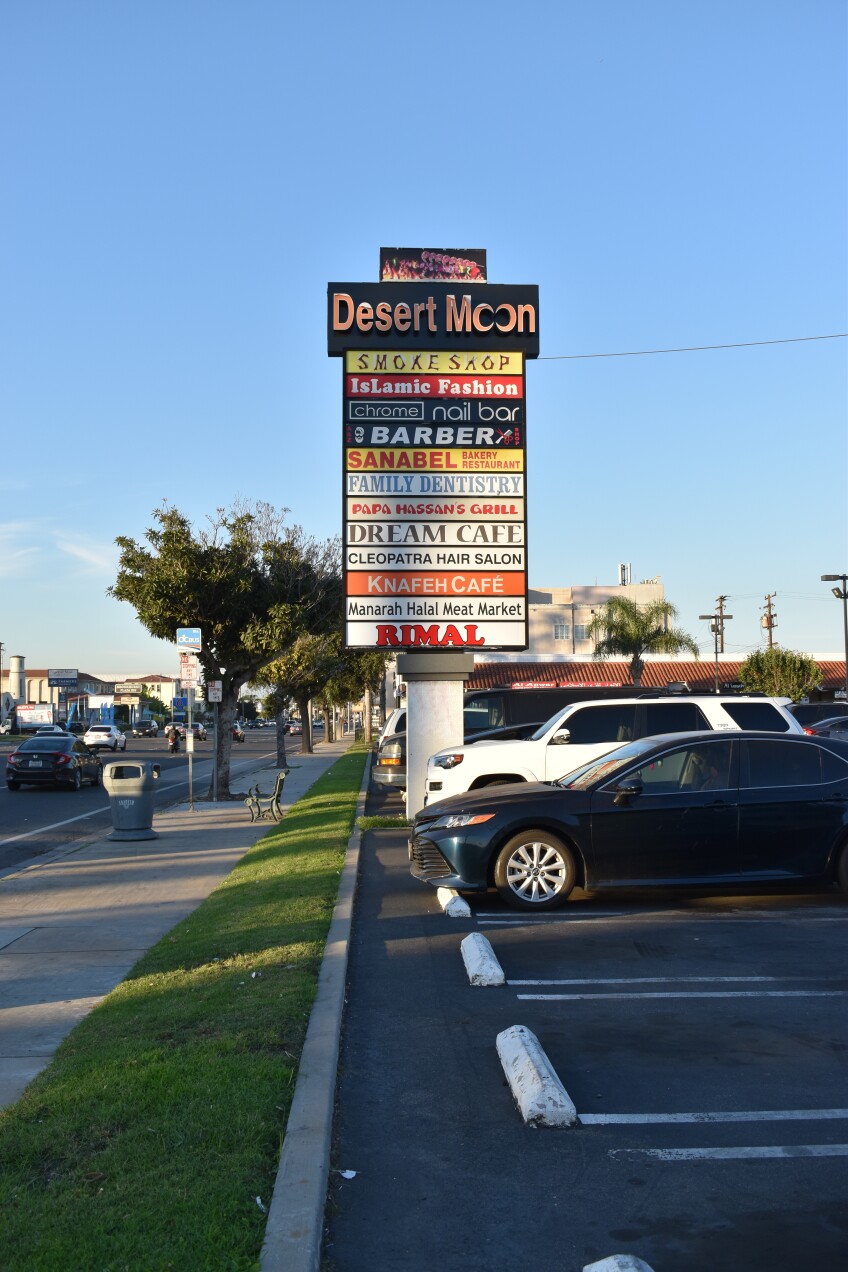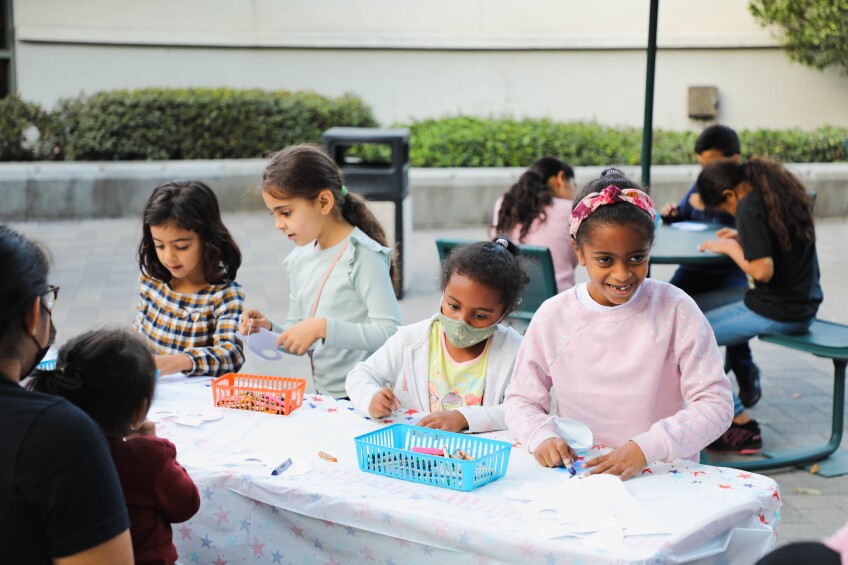
Welcome to Little Arabia: A Monthlong Celebration Makes This Community Feel Seen
Dania Alkhouli's bright, red blazer stands out as she flits between the round tables explaining the rules of barjees, dama (variant of checkers), tawleh (backgammon) and mancala. The adults listen intently to the rules, munching on zaatar man'oushe (flatbread topped with a mixture of thyme, sumac, sesame seeds and salt) and sipping on mint tea. The children shake the cowry shells on the table.
Alkhouli is eager to showcase the classic Arabic board games to the crowd gathered for game night as part of the Ahlan Wa Sahlan (meaning "welcome") Pan-Arabic Celebration at the Anaheim Public Library. The celebration highlights the contributions Arab Americans have made to American society and pays tribute to the unofficial Little Arabia neighborhood on Brookhurst Street, a 10-minute drive from the library. The cultural programs include workshops, story time sessions and panel discussions. Signboards displayed at the entrance to the library shed light on the Arab world, Arab American immigration to the United States and how this led to the creation of cultural pockets across America. Book exhibits around the library draw attention to the rich literary history of the Middle East and Levant region. A Country Called Syria, the non-profit Alkhouli founded with her mother, is one of the library's partners for the event.

In Syria, where Alkhouli is from, board games are an integral part of the culture. Communities gather at coffee houses and lounges to connect and bicker over board games on weekends.
"It's such a nice way to connect with each other and detox from the overreliance on technology and technological games that we have," Alkhouli said. "There's something different about the spirit of being at a table and playing a game with someone that's tangible."
Alkhouli began researching classical Arab games through her work for A Country Called Syria. The non-profit was started a year after the Syrian Revolution in 2012 with the goal of introducing people to the history and culture of a country that they were not familiar with and only heard about in the media.

As she explains the rules of the games, she also lets the crowd in on the history.
"Barjees actually originated in India ages ago and then it was actually brought to the Middle East by Syrians at the start of the 20th century," she said. "And it just kind of evolved in the way that it was played. Then it was introduced to Europe years later and became rebranded to look more European and they claimed to be the original source."
Like the American board game "Sorry!" barjees is played on a piece of intricately embroidered velvet fabric. Instead of dice, players roll six cowry shells to determine the number of moves.
Palestinian American Oruba Rabie and her family settle around one of the barjees tables to play the game. Living in Fullerton, Rabie and her family are frequent visitors to Anaheim's Little Arabia neighborhood. In the early 1990s, immigrants from Egypt, Syria, Lebanon and Palestine settled in the section of West Anaheim now referred to as Little Arabia. The area was left abandoned by the white flight out of the area. Now, local businesses, restaurants and grocery stores line the streets and it's become a community hub.
"When you come here to Anaheim, you can find everything that you're looking for, like modest clothing, halal food and halal restaurants," Rabie said.
Rabie makes the drive often because it is important to her that her children feel seen.

"It's really good because they get to have social relationships with other Arabs. They're coming from the same background, same culture, same traditions so they don't feel left out," she said. "They feel that they are welcome here in the United States."
The unofficial Little Arabia neighborhood holds a special place for Alkhouli too. After summer vacations in Syria, whenever she felt a longing for home, she would drive to Anaheim from Huntington Beach.
"It was like a little home away from home," she said. "If I ever wanted to live to feel like I was back in Syria again, that was always the place to go when I needed the mana'eesh (flatbread with different toppings) and the knafeh."
Alkhouli is excited for cultural programs like the one at the Anaheim Library because it allows the non-Arab community to experience her heritage.
"I think this is a great way to link the community and talk to your local neighbors and introduce them to things, whether it's food or games or, you know, music. We had music on the opening night," she said.
Rabie, who hosts a weekly story time segment as part of the Ahlan Wa Sahlan exhibitions, echoes Alkhouli. She has been fielding requests from the children for her session that includes songs, dances and stories to become a permanent feature at the library.

"Initially, I thought maybe 20 people would come, but it's been around 60 people. It's been massive and it's just a great opportunity for them (the community) to come together and learn about the language," said Guadalupe Gomez, the library services manager at the Anaheim Public Library, about the story time sessions. "Parents say, and I think there's always that concern, 'My children are losing the language or they're losing the traditions.'"
The Pan-Arabic Celebration at the Library was made possible by a California Humanities Library Innovation Lab grant. Through different events over the course of five weeks, the library hopes the non-Arab community will understand the barriers the Arab American community has experienced and overcome.

"Someone was standing, viewing the display last week and she said, 'You know, 10 years ago, I didn't exist,'" Gomez said about the response from the Arab American community. "She said, 'When you don't see yourself reflected in a book or no one highlights your culture, it's like we don't exist.'"
For Gomez and her colleague Curita Tinker, a library assistant who successfully got the grant, libraries are stewards of cultural heritage.
"People always say it's [Anaheim Public Library] a neutral place. We're not neutral," Gomez said. "It's that perfect avenue where we could come together and share our stories and share our culture and to say it's OK that we're different because that's what makes us unique."
Gomez and Tinker have been intentional in addressing the community's needs and want to extend programming beyond the five-week celebrations through partnerships and other grants.
"I think we have all said, I am more than just a month," Gomez said, referring to heritage months. "We want to be able to say 'No, it's all year round.'"




